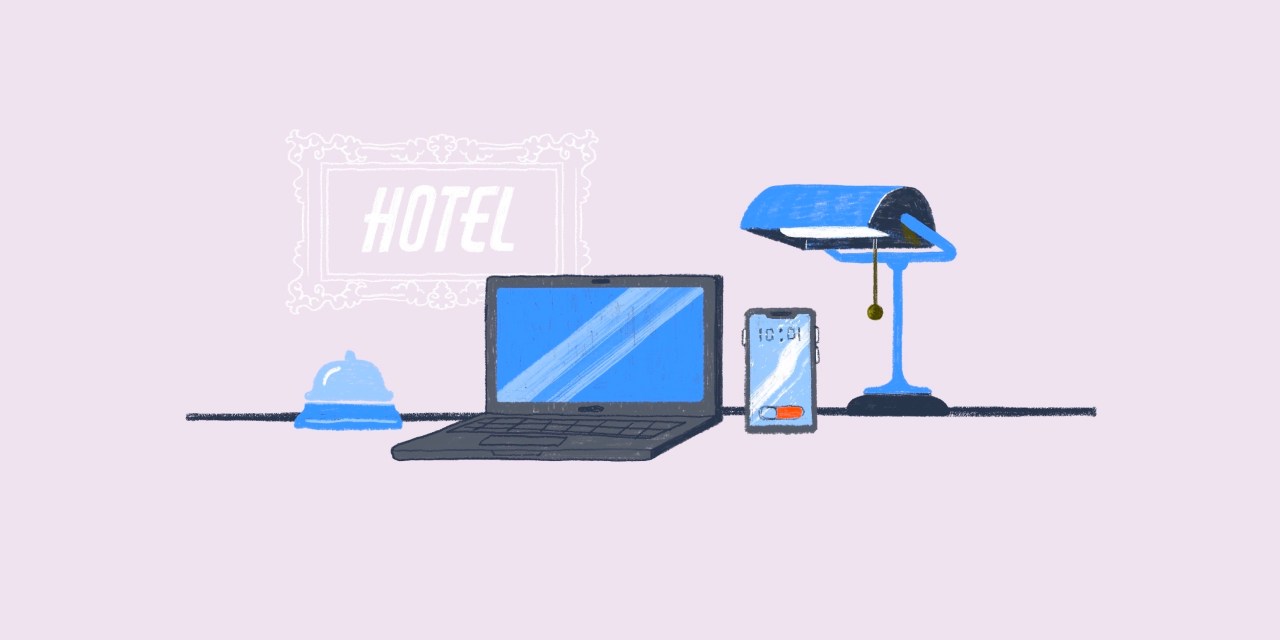How hotels are redesigning rooms to mimic ‘comfortable’ offices

Hotels are undergoing a complete design transformation to cater better for the remote worker.
That means bedrooms are being redesigned to mimic comfortable, individual offices, rather than spaces to unwind and sleep.
Some hotels are adding gym equipment to bedrooms so people can workout privately, rather than in a communal gym on a separate floor. And others are becoming more pet-friendly to encourage remote workers with furry friends in tow, according to hospitality professionals.
Four Seasons Hotel Minneapolis, which opened its doors last June, has created additional decorative wall backdrops in its bedrooms, so people can avoid having a bed in their background while on video calls. The hotel has also incorporated more power outlets into the traditional small desk areas within its bedrooms, and guests can connect their laptops to the TV screen and use it as a monitor.
The Four Seasons Hotel group also now offers in-room printers on request and safes large enough to fit laptops. Its room service menus have also been revamped with remote workers in mind. So instead of just offering main meals, they have a far larger range of snacks suitable for grazing on while working.
“From a design perspective, we really took interest in the digital worker for how we pointed our rooms,” said Gaman Guadagni, hotel manager for Four Seasons Hotel Minneapolis. “We thought about how to create an atmosphere within the room that equals an office, as comfortable as it can be.”
All its tables are now also larger and multi-purpose, positioned next to multiple power sockets to charge digital devices. “In the prior designs, it was a concept driven by food and beverage,” said Guadagni. “Now, the thinking is much more from a utilitarian perspective, not just here but at any of our newly renovated properties or new build outs.”
Hotels have long catered to the needs of business travelers, providing high-speed internet, business centers and other services like access to printers and technology. However, the rise of remote and hybrid working, in the wake of the pandemic, has increased the popularity of working from hotels as people take advantage of work-from-anywhere policies.
“As we think about hybrid work, people aren’t necessarily going in [to the office] on Mondays and Fridays, you see a compression towards that midweek standpoint,” said Jeanelle Johnson, PwC’s hospitality and leisure practice lead. “People are tacking on that additional leisure travel on the front end and back end of the weekend.”
Johnson added that more hotels are lowering their fees for pets or allowing larger pets that may have traditionally been rejected. She has also seen a shift toward less housekeeping – an attempt to make the experience more similar to a home environment, where bedsheets aren’t changed daily.
Redesigning for the remote worker is not just a trend in the U.S. either. For example, the Renaissance São Paulo Hotel in Brasil offers one room that comes complete with a fully-equipped online broadcasting system.
Meanwhile, at the Ritz-Carlton in Chile’s capital Santiago, there are meeting rooms equipped with the tech needed to facilitate hybrid meetings.
Aside from hotel redesign, hotel chains are amping up how they are marketing to remote workers. “It’s been a massive shift,” said Johnson.
For example, Kimpton Hotels & Restaurants released the “Bare Minimum Mondays with Kimpton Package,” at select properties, riffing off the latest workplace trend that suggests people ease back into the workweek slowly.
The hotel’s offer, available April through September, encourages guests to extend their weekend getaway with Sunday night rates starting at 20% off discounts, pool access, late checkouts, and complimentary cappuccinos and cocktails.
“Now more than ever, people are looking for ways to stay to play and to work,” said Kathleen Reidenbach, chief commercial officer at Kimpton. “In response, we are looking for ways to create new upleveled packages that fit those evolving needs to maximize experience and make the most of each stay. We saw an opportunity as a hospitality brand to invite our guests to extend their weekend stay and prioritize their creative work, self-care and mental wellness.”
While it’s only being offered at three locations currently, it’s a testament to how much hotels are considering this kind of worker and customer.
Reidenbach believes this trend is here to stay. “We addressed the onset of this trend a few years ago with creative ‘work from hotel’ offerings, and this new package is a continued evolution of that approach as we continue to see an uptick in hybrid work travel and business travel,” she said. “Most travelers continue to have flexible remote work schedules and therefore are able to travel mid-week or extend their stay past the weekend.”
Kimpton is now looking into a pilot program that provides bookable workspaces in select hotels for guests to meet face-to-face to take small, short-term business meetings.

